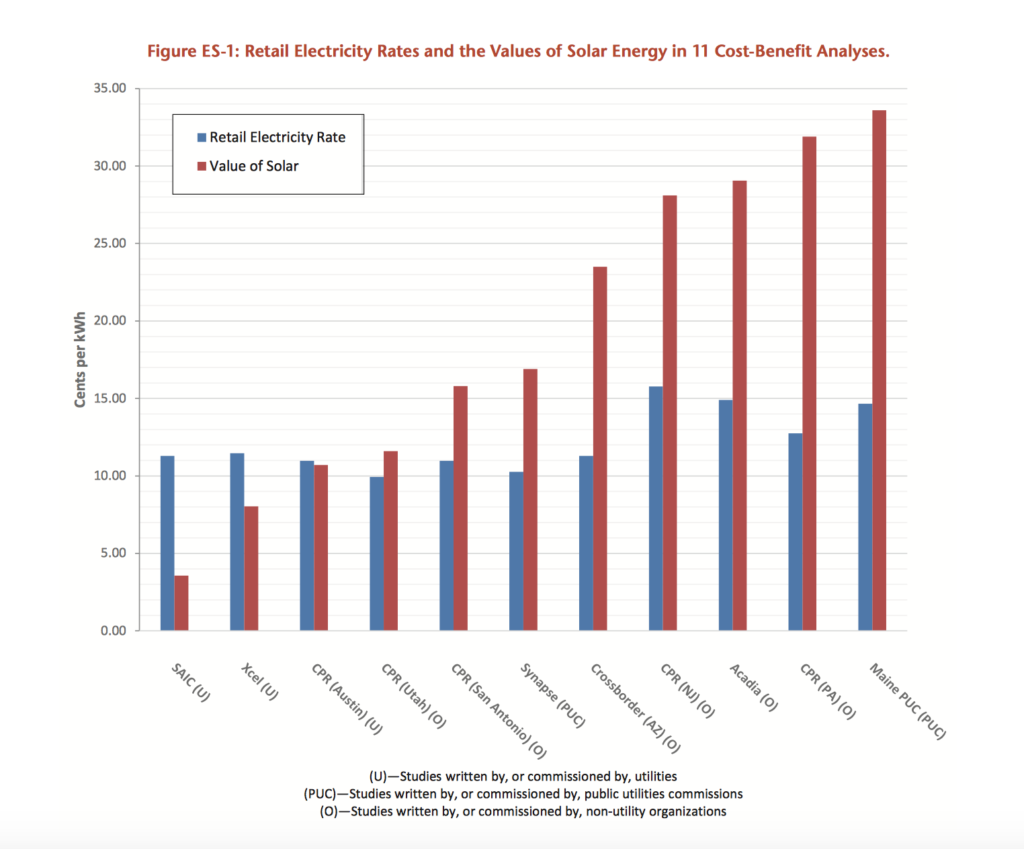Value of solar
Solar electricity is good for everyone. For solar panel owners, it lowers monthly electric bills, increases home value, and provides energy independence. Beyond individual solar owners, solar electricity also benefits society at large, creating local jobs, generating local wealth, improving energy security, and improving public health. Solar also benefits the entire electric grid. The brilliant tangle of wires, poles, substations, and meters that we call “the grid” is made stronger, cheaper, and more efficient thanks to distributed solar energy (like rooftop solar panels). This translates to long term savings for all ratepayers. Given the countless benefits that solar provides, what is its value? And how do we ensure that the full suite of benefits provided by solar energy is reflected in its price?
These are the questions central to the debate around the value of solar. Utilities have traditionally compensated solar electricity generated by homes and businesses at the retail electricity rate (i.e. the same rate you pay the utility for electricity). Thanks to net metering, most solar owners are credited at the full retail rate for the solar electricity they feed back onto the grid (when it’s not needed in the home). Valuing solar electricity at the retail rate has allowed solar owners to directly offset their monthly electric bills with the electricity they produce, translating to major savings. However, as we become more sophisticated at tracking and measuring the different benefits provided by solar, many solar advocates are asking themselves whether this valuation scheme is accurately reflecting the full value of solar. Given that solar benefits everyone, are solar owners compensated fairly for the solar electricity they produce?
The values and benefits of solar electricity
The value of solar debate happening across the country is focused on precisely this issue. It’s true that solar panels produce electricity, which has a financial value that solar owners can access to reduce their electric bills. But what about the value of that electricity to communities, local businesses, public health, employment, and energy security? The main benefits produced by solar fall into the following categories:
- Direct benefits to solar owners: When a homeowner or business owner installs solar panels, they generate their own solar electricity. This electricity offsets the electricity they must purchase from their utility, resulting in lower monthly electric bills. In addition to these savings, going solar at your home increases your home’s value when you go to sell your house. What’s more, many states offer monetary Renewable Energy Credits for solar electricity (separate from your electric bill savings), generating a little extra revenue for solar owners.
 Job creation: Thousands of solar workers are involved in helping homes and businesses go solar. From panel factory employees to salespeople to electricians to installers, the solar industry now employs more than 250,000 Americans full time. Thanks to homeowners and businesses installing solar panels, all 50 states now have a solar workforce.
Job creation: Thousands of solar workers are involved in helping homes and businesses go solar. From panel factory employees to salespeople to electricians to installers, the solar industry now employs more than 250,000 Americans full time. Thanks to homeowners and businesses installing solar panels, all 50 states now have a solar workforce.- Public health benefits: Solar electricity does not generate pollution, requires no water, and creates no hazardous waste. The more solar electricity we generate, the less pollution, water shortages, and contamination crises we face. These benefits accrue to everyone, not just solar owners. So, whether it’s coming from rooftops or large solar farms, solar electricity is a win for public health.
- Energy Security: With zero fuel inputs, solar is a more secure power source than coal or natural gas. Because there is no need to worry about fuel shortages, everyone benefits from stable power prices. Relying on home-grown solar power instead of imports also means we are less impacted by events in other countries. This protects our military personnel and translates to enormous savings for electricity consumers across the country.
- Improving the electric grid: When more solar electricity is generated, the whole electric grid works smarter, stronger, and more efficiently. Solar is now the cheapest form of power. So, more solar — regardless of where it’s generated or who is generating it — leads to lower prices for every single utility customer. And that’s especially true of distributed solar installations such as rooftop solar panels and small-scale commercial installations. On-site distributed solar generation reduces the need to transmit electricity over long distances from distant power plants. So more solar panels means less wear and tear on the grid, lower maintenance costs, and fewer expensive utility upgrades. These savings are shared among all ratepayers.
🌞 SUPPORT OUR WORK 🌞
Make a tax-deductible donation today to Solar United Neighbors to help more people go solar, join together, and fight for their energy rights.
Who receives the benefits of solar?
 Beyond the direct bill savings that accrue just to solar owners, solar electricity benefits everyone. More solar jobs are good for all Americans; less air pollution improves the health of all Americans; homegrown energy improves national security; and a better-functioning electric grid means cheaper, more reliable power for everyone. Sadly, solar opponents often ignore these widespread benefits. In a deliberate attempt to slow the growth of solar, many of these opponents — from monopoly utilities to fossil fuel companies — claim that solar only benefits those people with the resources to install panels on their own roof. That couldn’t be farther from the truth. And, thanks to emerging valuation efforts, we now have the tools to quantify the value solar energy provides to society at large.
Beyond the direct bill savings that accrue just to solar owners, solar electricity benefits everyone. More solar jobs are good for all Americans; less air pollution improves the health of all Americans; homegrown energy improves national security; and a better-functioning electric grid means cheaper, more reliable power for everyone. Sadly, solar opponents often ignore these widespread benefits. In a deliberate attempt to slow the growth of solar, many of these opponents — from monopoly utilities to fossil fuel companies — claim that solar only benefits those people with the resources to install panels on their own roof. That couldn’t be farther from the truth. And, thanks to emerging valuation efforts, we now have the tools to quantify the value solar energy provides to society at large.
Measuring the value of solar
 In dozens of states, energy regulators are undertaking processes to quantify the value solar electricity provides to state residents and the state’s electric system. This undertaking is widely referred to as a “value of solar” study. Different states are attempting to quantify the “value of solar” for different reasons: to create a more precise compensation mechanism for solar generation; to combat solar opponents’ false claims that solar only benefits its direct owners; or to develop more accurate information for policymakers. In the most extreme cases, some state regulators have undertaken these studies in response to utility attempts to devalue solar and exaggerate its costs. And it’s not just the traditionally pro-solar states doing it. From Minnesota to Maine, New York to Oregon, blue states, red states, rural states, and urban states have recognized the importance of quantifying the value of solar energy generated in their backyards.
In dozens of states, energy regulators are undertaking processes to quantify the value solar electricity provides to state residents and the state’s electric system. This undertaking is widely referred to as a “value of solar” study. Different states are attempting to quantify the “value of solar” for different reasons: to create a more precise compensation mechanism for solar generation; to combat solar opponents’ false claims that solar only benefits its direct owners; or to develop more accurate information for policymakers. In the most extreme cases, some state regulators have undertaken these studies in response to utility attempts to devalue solar and exaggerate its costs. And it’s not just the traditionally pro-solar states doing it. From Minnesota to Maine, New York to Oregon, blue states, red states, rural states, and urban states have recognized the importance of quantifying the value of solar energy generated in their backyards.
The vast majority of these studies have concluded the same thing. Solar is undervalued by retail rate net metering alone.
In other words, the retail rate credit that solar owners receive for the electricity they produce actually low balls the real value of that electricity. The graph below compares estimates from several studies. The vast majority found the value of solar to be greater than the retail electricity rate. For example, the Public Utilities Commission of Maine found that the true value of solar is close to $0.35 per kWh. Maine’s retail rate of electricity hovers around $0.15 per kWh. So, in this case, the value of solar electricity in Maine is more than twice the regular retail value of electricity. That means solar owners are putting twice as much value onto the grid as they’re being compensated for via net metering.
The outcomes of value of solar undertakings are twofold: to create a financial estimate of the actual value of solar electricity, and to develop a methodology to measure that value moving forward. In efforts that have yielded the former (an actual financial value), you can often see variation in the solar value estimate based on who conducted the study. Of the 11 studies highlighted below, the only ones that estimated the value of solar electricity to be less than the value of retail electricity were commissioned by utilities. As more value of solar studies and proceedings are initiated across the country, it’s important to keep in mind who is doing them and their vested interests in their outcome.

Compensating solar owners for the full value of their solar electricity
 Solar energy provides benefits and value to the entire grid, not just to solar owners. Thanks to state value of solar studies, we now have the data to prove it. Knowing that solar provides more benefits than its owners are compensated for, and that solar owners provide a net benefit to society, how can we ensure that solar owners get fairly compensated for the electricity they produce?
Solar energy provides benefits and value to the entire grid, not just to solar owners. Thanks to state value of solar studies, we now have the data to prove it. Knowing that solar provides more benefits than its owners are compensated for, and that solar owners provide a net benefit to society, how can we ensure that solar owners get fairly compensated for the electricity they produce?
Traditionally, solar owners have been compensated through retail rate net metering. This means they get credit for the electricity they produce at the same retail rate at which they pay for utility electricity. But, as states discover that the value of solar is greater than the retail rate, many are designing new rate structures that better reflect the full value of solar electricity. From time of use rates in California to new value of solar rates in New York, these experiments are looking into new ways to ensure solar owners receive credit for the full, real value of the electricity they produce.
Resources
- Resources from Fighting the Myth of a Solar Cost Shift webinar hosted by Solar United Neighbors in 2020: Q&A, presentation slides, and recording
- Myth of the Solar Cost Shift 1-pager: summarizes the cost-shift myth and value of solar.
- Myth of the Solar Cost Shift handout: in-depth 4-page handout including the main points from the webinar linked above on the cost-shift myth and value of solar.
- Why Solar Panels Aren’t Unfair or a Scam: a 20 minute video that further debunks the myth of the solar cost shift.
- Study Shows Homeowners with PV are Subsidizing Their Neighbors (Solar Power World article) & direct link to Michigan Tech study with results showing “..that grid-tied utility customers are being grossly under-compensated in most of the U.S. as the value of solar eclipses the net metering rate as well as two-tiered rates.”
- The True Value of Solar – This report reviews more than a dozen studies conducted to determine the value rooftop solar provides to the electric grid and communities at large.
- Why rooftop solar does not shift costs to non-solar owners – Solar United Neighbors intern Lea Booth looks behind the utilities arguments against rooftop solar and why they are faulty.
- Power To The People! Michigan Tech Researchers Say Distributed Renewables Save Utility Customers Money – A new study finds that going solar is a good financial deal for Michigan residents. It can save $42/month for those in the Upper Peninsula, where energy costs are highest, an $30/month in the rest of the state.
- Solar in Michigan: The Economic Impact of Distributed Generation on Non-Solar Customers – The Institute for Energy Innovation reviewed roughly fifty studies and found that the benefits of rooftop solar outpace its costs.
- Value of Solar meta-analysis – This 2016 report from the Brookings Institution concludes that net metered, rooftop solar is a net benefit to all ratepayers.
- Shining Rewards: The Value of Rooftop Solar Power for Consumers and Society – This 2015 report from Environment America asserts the value of solar energy by comparing multiple cost-benefit value studies conducted across the country.
- Solar cost-benefit studies – A compilation of all state-wide value of solar studies from the Solar Energy Industries Association with links to the studies.
- How two value-of-solar studies add up to no clear value of solar – This article from Utility Dive takes a look at two 2018 value of solar studies to compare the different findings and describe the various factors that should be included when calculating the value of rooftop solar.
